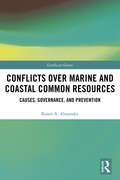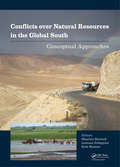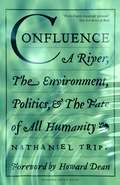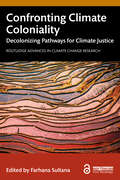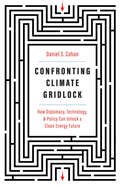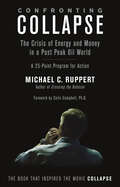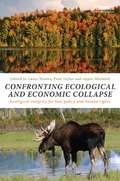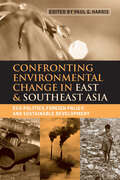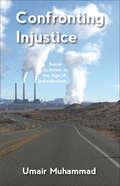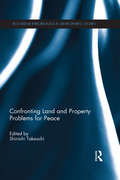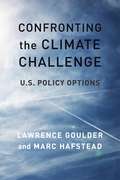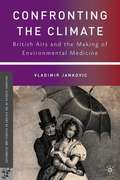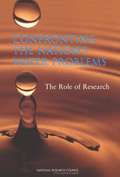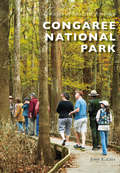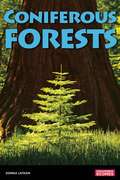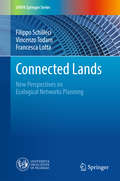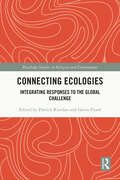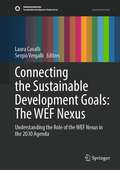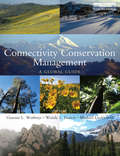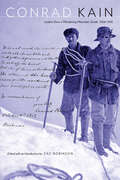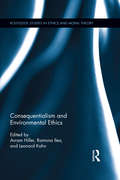- Table View
- List View
Conflicts over Marine and Coastal Common Resources: Causes, Governance and Prevention (Earthscan Oceans)
by Karen A. AlexanderThis book explores the types of conflicts that occur over marine and coastal resources, the underlying causes, and attempts to prevent them. Despite the emergence of various marine and coastal governance approaches to address the effects of human activities within the marine environment, conflict continues. In this book, the author outlines the reasons conflicts can, and do, arise in the marine and coastal environment. Drawing on case studies from both the northern and southern hemispheres, the book takes a broad view of how we interact with our environment, of how and why conflict is perpetuated as a political and cultural phenomenon, and how this varies or remains constant across space and place. The case studies explore not only the underlying perceptions and needs of those involved in marine and coastal conflict and the types of conflicts that arise in oceanic and coastal areas, but also the underpinning reasons for these conflicts. Marine and coastal resource conflicts have the potential to derail conservation efforts and blue growth policies, as well as the United Nations Sustainable Development Goals. Thus, it is imperative we understand the drivers and exacerbating factors of marine and coastal conflict. Arguing that there is an urgent need for renewed thinking and focus on conflict prevention, the author develops a theory of marine and coastal conflict which allows us to understand those factors and the means to help prevent such conflicts arising in the first place. This book will be of interest to students and researchers of coastal and marine science and environmental management as well as those working in the field of marine resource management, including coastal zone managers and fisheries managers.
Conflicts over Natural Resources in the Global South: Conceptual Approaches
by Lorenzo Pellegrini Maarten Bavinck Erik MostertInhabitants of poor, rural areas in the Global South heavily depend on natural resources in their immediate vicinity. Conflicts over and exploitation of these resources � whether it is water, fish, wood fuel, minerals, or land � severely affect their livelihoods. The contributors to this volume leave behind the polarised debate, previously surround
Confluence: A River, The Environment, Politics, & The Fate of All Humanity
by Nathaniel TrippAmidst the global free market economy, the author warns us against the politicization of various issues and wants us to look at the larger issues like global warming.
Confronting Climate Coloniality: Decolonizing Pathways for Climate Justice (Routledge Advances in Climate Change Research)
by Farhana SultanaThis timely and urgent collection brings together cutting-edge interdisciplinary scholarship and ideas from around the world to present critical examinations of climate coloniality.Confronting Climate Coloniality exposes how legacies of colonialism, imperialism, and capitalism co-produce and exacerbate the climate crisis, create disproportionate impacts on those who contributed the least to climate change, and influence global and local responses. Climate coloniality is perpetuated through processes of neoliberalism, racial capitalism, development interventions, economic growth models, media, and education. Confronting climate coloniality entails decolonizing climate discourses and governance, challenging the dominant framings and policies, interrogating material, geopolitical, and institutional arrangements for tackling the climate crisis, and centering Global South and Indigenous knowledge, experiences, strategies, and solutions. Confronting Climate Coloniality: Decolonizing Pathways for Climate Justice provides critical insights and strategies for transformative action and fosters deeper understandings of the structural injustices entangled with climate change in governance, framings, policies, responses, and praxis. This collection offers pioneering interdisciplinary research on alternative frameworks for decolonized approaches for more meaningful climate justice.With originality, scholarly rigor, and emphasis on amplifying marginalized voices, this collection is an indispensable resource for interdisciplinary scholars, policymakers, and activists committed to advancing climate justice.
Confronting Climate Gridlock: How Diplomacy, Technology, and Policy Can Unlock a Clean Energy Future
by Daniel S CohanAn atmospheric scientist explains why global climate change mitigation and energy decarbonization demand American diplomacy, technology, and policy &“Daniel Cohan makes a compelling case that the problem of climate change is solvable. Fixing the gridlock on global action requires fixing the gridlock here in the United States of America. Cohan shows how that can be done.&”—David Victor, UC San Diego Professor of environmental engineering Daniel Cohan argues that escaping the gravest perils of climate change will first require American diplomacy, technological innovation, and policy to catalyze decarbonization globally. Combining his own expertise along with insights from more than a hundred interviews with diplomats, scholars, and clean-technology pioneers, Cohan identifies flaws in previous efforts to combat climate change. He highlights opportunities for more successful strategies, including international &“climate clubs&” and accelerated development of clean energy technologies. Grounded in history and emerging scholarship, this book offers a forward-looking vision of solutions to confronting climate gridlock and a clear-eyed recognition of the challenges to enacting them.
Confronting Collapse: The Crisis of Energy and Money in a Post Peak Oil World
by Michael C. RuppertThe book that inspired the movie Collapse.The world is running short of energy-especially cheap, easy-to-find oil. Shortages, along with resulting price increases, threaten industrialized civilization, the global economy, and our entire way of life.In Confronting Collapse, author Michael C. Ruppert, a former LAPD narcotics officer turned investigative journalist, details the intricate connections between money and energy, including the ways in which oil shortages and price spikes triggered the economic crash that began in September 2008. Given the 96 percent correlation between economic growth and greenhouse gas emissions and the unlikelihood of economic growth without a spike in energy use, Ruppert argues that we are not, in fact, on the verge of economic recovery, but on the verge of complete collapse.Ruppert's truth is not merely inconvenient. It is utterly devastating.But there is still hope. Ruppert outlines a 25-point plan of action, including the creation of a second strategic petroleum reserve for the use of state and local governments, the immediate implementation of a national Feed-in Tariff mandating that electric utilities pay 3 percent above market rates for all surplus electricity generated from renewable sources, a thorough assessment of soil conditions nationwide, and an emergency action plan for soil restoration and sustainable agriculture.
Confronting Ecological and Economic Collapse: Ecological Integrity for Law, Policy and Human Rights
by Laura Westra Prue Taylor Agnès MichelotFrom the first appearance of the term in law in the Clean Water Act of 1972 (US), ecological integrity has been debated by a wide range of researchers, including biologists, ecologists, philosophers, legal scholars, doctors and epidemiologists, whose joint interest was the study and understanding of ecological/biological integrity from various standpoints and disciplines. This volume discusses the need for ecological integrity as a major guiding principle in a variety of policy areas, to counter the present ecological and economic crises with their multiple effects on human rights. The book celebrates the 20th anniversary of the Global Ecological Integrity Group and reassesses the basic concept of ecological integrity in order to show how a future beyond catastrophe and disaster is in fact possible, but only if civil society and ultimately legal regimes acknowledge the necessity to consider ecointegrity as a primary factor in decision-making. This is key to the support of basic rights to clean air and water, for halting climate change, and also the basic rights of women and indigenous people. As the authors clearly show, all these rights ultimately depend upon accepting policies that acknowledge the pivotal role of ecological integrity.
Confronting Environmental Change in East and Southeast Asia: Eco-politics, Foreign Policy and Sustainable Development
by Paul G Harris'This is clearly a book with great breadth and diversity... a valuable addition to the literature about east and southeast Asia.'T Forsyth, Development Studies Institute London School of Economics and Political Science, in Land Degradation and DevelopmentAs their economies and populations expand, almost all Asian countries are experiencing profound ecological problems at the national, regional and global level; be it air pollution in rapidly growing cities, trans-boundary water pollution or climate change. While the countries of East and Southeast Asia are the victims of environmental change, they are also complicit in causing it at home and abroad. As these countries move towards international environmental cooperation, a central issue becomes the vital connection between foreign policy and environmental problems. Foreign policy is about pursuing and promoting national interests, however it is not always clear what a country's national interests are or ought to be, particularly with regard to complex international ecological issues. On top of this, it is almost always debatable how best to promote them.Confronting Environmental Change in East and Southeast Asia is a collection of concise, hard-hitting essays by a group of international experts and scholars that address these complex issues. The book takes foreign policy considerations into account in its analyses of how states and other actors in East and Southeast Asia confront environmental change through international cooperation and environmentally sustainable development.The first part of the book examines many of the actors, institutions and forces shaping environmental diplomacy and foreign policy in East Asia, with a focus on China and Japan. The second part of the book takes a deeper look at the relationships between ecological politics, international relations and environmentally sustainable development in East and Southeast Asia. Several chapters in the second part focus on how environmental foreign policies impact countries in the region as they endeavour to implement environmentally sustainable development. Together, the analysis and case studies in this volume illuminate how environmental change is confronted - or not - in East and Southeast Asia, with a host of important insights for researchers, governments, policy-makers, conservationists and business people dealing with the profound environmental problems facing the region.
Confronting Injustice: Social Activism in the Age of Individualism
by Umair Muhammad“Written by an activist for activists . . . a powerful call for collective action against the social causes of poverty and climate change.” —Climate & CapitalismA new generation of activists working for economic and environmental justice, and against war and poverty, confronts critical questions. Why is the world so unjust and crisis-prone? What kind of world should we fight for? How can we win? In this panoramic yet accessible book, Umair Muhammad engages with these and other urgent debates. He argues that individual solutions like “buying green” are dead ends and that hope for the future lies in a radical expansion of democracy and the transformation of the economy from one based on profit to one that can meet human needs.“A highly recommended read for those who are interested in working together to transform society.” —Chelsey Rhodes, founder of DelusionsofDevelopment.com“This book will force activists to check their intentions. I wasn’t even halfway done before I wanted to share it with everyone I knew.” —Maryama Ahmed, Toronto-based community organizer“A wide-ranging and unflinching look at the global nature of the challenges contemporary activists seek to address. Its blend of environmental and anti-imperialist analysis, grounded in direct organizing experience, makes this a powerful and important resource.” —Dru Oja Jay, coauthor of Paved with Good Intentions“What [Umair] provides is an opening statement in an important discussion that activists must have . . . A must-read book for today’s activists.” —Ian Angus, author of A Redder Shade of Green
Confronting Land and Property Problems for Peace (Routledge Explorations in Development Studies)
by Shinichi TakeuchiThis collection clarifies the background of land and property problems in conflict-affected settings, and explores appropriate policy measures for peace-building. While land and property problems exist in any society, they can be particularly exacerbated in conflict-affected settings – characterized by unstable security, weak governance, loss of proper documentation as well as the return of refugees and Internally Displaced Persons. Unless these problems are properly addressed, they can destabilize fragile political order and hinder economic recovery. Although tackling land and property problems is an important challenge for peace-building, it has been relatively neglected in recent debates about liberal peace-building as a result of the strong focus on state-level institution building, such as security sector reforms and transitional justice. Using rich original data from eight conflict-affected countries, this book examines the topic from the viewpoint of State-society relationship. In contrast to previous literature, this volume analyses land and property problems in conflict-afflicted areas from a long-term perspective of state-building and economic development, rather than concentrating only on the immediate aftermath of the conflict. The long-term perspective enables not only an understanding of the root causes of the property problems in conflict-affected countries, but also elaboration of effective policy measures for peace. Contributors are area specialists and the eight case study countries have been carefully selected for comparative study. The collection applies a common framework to a diverse group of countries – South Sudan, Uganda, Rwanda, Burundi, Cambodia, Timor-Leste, Colombia, and Bosnia-Herzegovina.
Confronting the Climate Challenge: U.S. Policy Options
by Lawrence Goulder Marc HafsteadWithout significant reductions of greenhouse gas emissions, climate change will cause substantial damage to the environment and the economy. The scope of the threat demands a close look at the policies capable of reducing the harm. Confronting the Climate Challenge presents a unique framework for evaluating the impacts of a range of U.S. climate-policy options, both for the economy overall and for particular household groups, industries, and regions. Lawrence Goulder and Marc Hafstead focus on four alternative approaches for reducing carbon dioxide emissions: a revenue-neutral carbon tax, a cap-and-trade program, a clean energy standard, and an increase in the federal gasoline tax. They demonstrate that these policies—if designed correctly—not only can achieve emissions reductions at low cost but also can avoid placing undesirable burdens on low-income household groups or especially vulnerable industries.Goulder and Hafstead apply a multiperiod, economy-wide general equilibrium model that is distinct in its attention to investment dynamics and to interactions between climate policy and the tax system. Exploiting the unique features of the model, they contrast the shorter- and longer-term policy impacts and focus on alternative ways of feeding back—or “recycling”—policy-generated revenues to the private sector. Their work shows how careful policy design, including the judicious use of policy-generated revenues, can achieve desired reductions in carbon dioxide emissions at low cost, avoid uneven impacts across household income groups, and prevent losses of profit in the most vulnerable U.S. industries. The urgency of the climate problem demands comprehensive action, and Confronting the Climate Challenge offers important insights that can help elevate policy discussions and spur needed efforts on the climate front.
Confronting the Climate: British Airs and the Making of Environmental Medicine
by Vladimir JankovićThis book explores the social origins of the Western preoccupation with health and environmental hazards. It looks at the rise of the dichotomy between the vulnerable 'in' and the threatening 'out' by examining the pathologies associated with weather, domestic space, ventilation, clothing, and travel in Britain at the turn of the 19th century.
Confronting the Nation's Water Problems: The Role of Research
by Committee on Assessment of Water Resources ResearchIn order to confront the increasingly severe water problems faced by all parts of the country, the United States needs to make a new commitment to research on water resources. A new mechanism is needed to coordinate water research currently fragmented among nearly 20 federal agencies. Given the competition for water among farmers, communities, aquatic ecosystems and other users-as well as emerging challenges such as climate change and the threat of waterborne diseases-Confronting the Nation's Water Problems concludes that an additional $70 million in federal funding should go annually to water research. Funding should go specifically to the areas of water demand and use, water supply augmentation, and other institutional research topics. The book notes that overall federal funding for water research has been stagnant in real terms for the past 30 years and that the portion dedicated to research on water use and social science topics has declined considerably.
Congaree National Park (Images of Modern America)
by John E. CelyLocated in central South Carolina, only a few miles from the capital city of Columbia, Congaree National Park is the largest old-growth bottomland hardwood forest left in the country and one of the most biologically diverse parks within the national park system. Nearly 100 species of trees have been documented within the park, almost as many as in the entire Pacific Northwest. The park has one of the tallest hardwood forests anywhere in the temperate world and features numerous trees of record-setting proportions, a distinction that has earned it the name �Forest of Champions.� This book discusses the early history of the area that later became the Congaree National Park, shows efforts to protect it from logging by a citizen�s grassroots campaign, traces the park�s early beginnings and development, and illustrates some of the park�s notable flora and fauna.
Coniferous Forests
by Donna LathamInvestigating a variety of biomes and today's natural and human threats to their preservation, this interactive series challenges young readers to look at how their own actions influence the planet's health. Four distinct environments are explored in detail, showcasing the assortment of plants and animals that inhabit these outdoor communities as well as how they have adapted to their surroundings. Offering fascinating facts on each ecosystem along with vocabulary-building sidebars, these guides show budding scientists how they can contribute towards ongoing conservation efforts. The diverse woodland of coniferous forests is revealed in this detailed resource, covering topics such as the dangers of deforestation, over hunting, and forest fires, illustrating the rapid decline of this ecosystem's biodiversity.
Connected Lands: New Perspectives on Ecological Networks Planning (UNIPA Springer Series)
by Filippo Schilleci Vincenzo Todaro Francesca LottaThis book explores and outlines the reference theoretical basis of ecological networks within the international debate, focusing on how protected areas should no longer be considered as the sum of different components but rather as a network. The various European, transnational and national models of ecological networks/connections are analyzed on the basis of a detailed, updated study of relevant documents. The complex picture that emerges shows a wide range of reticular-ecological models within European plans and programs, but also many non-integrated experiences. The book subsequently examines the regulation of ecological networks/connections within planning instruments, explaining the critical points and referring to different ecological network models and specific local realities. Lastly, the book addresses two Italian case studies regarding the different normative and planning frameworks, both at a national and regional level, and demonstrating not only how ecological networks/connections can be structured within plans, but also how these networks/connections represent the core element of territory development and preservation. As such, it provides an essential tool for containing habitat fragmentation, offering a new perspective that integrates theoretical approaches and methods with planning models and the lessons learned from local applications.
Connecting Ecologies: Integrating Responses to the Global Challenge (Routledge Studies in Religion and Environment)
by Gavin Flood Patrick RiordanConnecting Ecologies focuses on the environmental aspects of Pope Francis’ encyclical Laudato Si’ and the challenge to care for our common home. It considers how best to devise and implement the new societal models needed to tackle the ecological problems facing the world today. The book addresses the need for and complexity of an integral ecology, one that looks not only at physical and biological processes but also allows for the contributions of theology, philosophy, spirituality, and psychology, including the implications for the human and social sciences. The contributions document four categories of resonances, resources, requirements, and responses evoked by a reading of Laudato Si’ and include consideration of other faith traditions. They reflect on how care for our common home motivates people in different places, cultures, and professions to cooperate for myriad goods in common. The volume is particularly relevant for scholars working in religious studies and theology with an interest in ecology, the environment, and the Anthropocene.
Connecting the Drops: A Citizens' Guide to Protecting Water Resources
by Karen Schneller-McdonaldThe need for improved water resource protection, beginning with grassroots action, is urgent. The water we use depends on networks of wetlands, streams, and watersheds. Land-use activities, however, are changing these natural systems. Often these changes result in ecological damage, flooding, water pollution, and reduced water supply. We need a healthy environment that sustains our personal and community health; we also need vibrant and sustainable economic development that does not destroy the benefits we derive from nature. Our ability to accomplish both depends on how well we can "connect the drops."In this book, Karen Schneller-McDonald presents the basics of water resource protection: ecology and watershed science; techniques for evaluating environmental impacts; obstacles to protection and how to overcome them; and tips for protection strategies that maximize chances for success. Schneller-McDonald makes clear the important connections among natural cycles, watersheds, and ecosystems; the benefits they provide; and how specific development activities affect water quality and supply.The methods described in Connecting the Drops have broad application in diverse geographic locations. The environmental details may differ, but the methods are the same. For water resource managers and concerned citizens alike, Connecting the Drops helps readers interpret scientific information and contextualize news media reports and industry ads--ultimately offering "how to" guidance for developing resource protection strategies.
Connecting the Sustainable Development Goals: Understanding the Role of the WEF Nexus in the 2030 Agenda (Sustainable Development Goals Series)
by Laura Cavalli Sergio VergalliThis contributed volume offers a state-of-the-art, holistic overview of the employment of a Water-Energy-Food (WEF) Nexus approach to implement the seventeen United Nations Sustainable Development Goals (SDGs), with a geographical focus on applications in different African regions. The book is divided into three sections, each composed of several chapters contributed by experts in their respective fields. Section I introduces the WEF Nexus and its role in the achievement of the 2030 Agenda and the SDGs. It highlights the attempt to connect different spheres of sustainability thanks to the Nexus, taking advantage of the existing interlinkages and interconnections among the Goals. Section II proposes a multi-scale and multi-stakeholder approach to various aspects of the Nexus and reviews existing quantitative tools. This section focuses on the issue of resource control and development aims and spotlights how Nexus dynamics influence the achievement of the SDGs as a whole. Section III applies the WEF Nexus to different African regions, which are balancing a rising population and an economic boom with severe vulnerability in the face of climate change.
Connectivity Conservation Management: A Global Guide
by Michael Lockwood Graeme L. Worboys Wendy L. FrancisIn an era of climate change, deforestation and massive habitat loss, we can no longer rely on parks and protected areas as isolated 'islands of wilderness' to conserve and protect vital biodiversity. Increasing connections are being considered and made between protected areas and 'connectivity' thinking has started to expand to the regional and even the continental scale to match the challenges of conserving biodiversity in the face of global environmental change. This groundbreaking book is the first guide to connectivity conservation management at local, regional and continental scales. Written by leading conservation and protected area management specialists under the auspices of the World Commission on Protected Areas of IUCN, the International Union for the Conservation of Nature, this guide brings together a decade and a half of practice and covers all aspects of connectivity planning and management The book establishes a context for managing connectivity conservation and identifies large scale naturally interconnected areas as critical strategic and adaptive responses to climate change. The second section presents 25 rich and varied case studies from six of the eight biogeographic realms of Earth, including the Cape Floristic Region of Africa, the Maloti-Drakensberg Mountains, the Australian Alps to Atherton Corridor, and the Sacred Himalayan Landscape connectivity area (featuring Mount Everest.) The remarkable 3200 kilometre long Yellowstone to Yukon corridor of Canada and the United States of America is described in detail. The third section introduces a model for managing connectivity areas, shaped by input from IUCN workshops held in 2006 and 2008 and additional research. The final chapter identifies broad guidelines that need to be considered in undertaking connectivity conservation management prior to reinforcing the importance and urgency of this work. This handbook is a must have for all professionals in protected area management, conservation, land management and resource management from the field through senior management and policy. It is also an ideal reference for students and academics in geography, protected area management and from across the environmental and natural sciences, social sciences and landuse planning. Published with Wilburforce Foundation, WWF, ICIMOD, IUCN, WCPA, Australian Alps and The Nature Conservancy.
Conquest
by Julian StockwinThe 12th volume in the popular high-seas nautical adventure series featuring naval hero Thomas Kydd. Newly victorious at the Battle of Trafalgar, England now rules the seas and is free to colonize the furthest reaches of the world. Captain Thomas Kydd joins an expedition to take Dutch-held Cape Town, a strategic harbor that will give England a rich trade route to India. With enemies lurking on all sides, Kydd and his men must defend the fragile colony while braving Africa's vast and hostile hinterland. When Renzi learns too much about the enemy's plans, even Kydd may not be able to save him.
Conrad Kain: Letters from a Wandering Mountain Guide, 1906–1933 (Mountain Cairns)
by Zac RobinsonExamine the life of the pioneering guide in these 144 letters sharing his thoughts on immigrating to Canada, his passion for nature, his travels, and more.Conrad Kain is a titan amongst climbers in Canada and is well-known in mountaineering circles all over the world. His letters to Amelie Malek—a life-long friend—offer a candid view into the deepest thoughts of the Austrian mountain guide, and are a perfect complement to his autobiography, Where the Clouds Can Go. The 144 letters provide a unique and personal view of what it meant to immigrate to Canada in the early part of the twentieth century. Kain’s letters are ordered chronologically with annotations, keeping the sections in English untouched, while those in German have been carefully translated. Historians and mountain culture enthusiasts worldwide will appreciate Kain’s genius for description, his passion for nature, his opinions, and his musings about his life.“In a culture that enjoys as many romantic figures as there are mountain peaks on the horizon as viewed from a lofty summit, Conrad Kain holds a special place in the historical landscape of western Canada’s mountains. Robinson . . . makes no secret of his affection for Kain, and that's a good thing, because he handles the letters Kain wrote throughout his adult life while guiding in Canada and New Zealand to his dear friend in Austria, Amelie Malek, with the care and reverence they so richly deserve.” —Lynn Martel, Alpine Club of Canada Gazette“From his letters, it’s obvious that Kain loved climbing mountains for the physical challenge, to meet interesting people, to make a living, and for opportunities to travel around the world, but most especially because of his all-consuming love of the natural world.” — Cyndi M. Smith, The Canadian Field-Naturalist, Vol. 129, No. 1
Conscious Coastal Cities: Sustainability, Blue Green Growth, and The Politics of Imagination
by Voula P. MegaIn the age of urban geopolitics, in cooperation with the major city networks and initiatives, interconnected coastal cities lead towards a more resilient sustainable future. This book raises global awareness on the challenges and opportunities for coastal cities and the myriad of issues and stakeholders which impact them. The book offers a panoramic integrated view of the most critical urban coastal sustainability issues shaping the urban horizon of the future. Drawing on the most authoritative studies and asking further questions, the book embraces issues of smart, sustainable and inclusive blue green growth, active social integration, environmental conscience and resilience, food, energy and resource security, exploration and protection of the global ocean, ecosystem-based urban coastal planning and policy and progress in education and science, culture and the arts, coastal urban renaissance and accountable multi-layered governance. From large global ports to small tourism and fishing resorts, sustainable development calls for coastal cities to improve their functions. Coastal cities need to adopt ecosystem-based approaches to manage the land-sea continuum, invest in blue green energy and mobility, attract responsible business investment, and honour the sea as a source of infinite innovation and culture.
Consequentialism and Environmental Ethics: Consequentialism And Environmental Ethics (Routledge Studies in Ethics and Moral Theory)
by Ramona Ilea Avram Hiller Leonard KahnThis volume works to connect issues in environmental ethics with the best work in contemporary normative theory. Environmental issues challenge contemporary ethical theorists to account for topics that traditional ethical theories do not address to any significant extent. This book articulates and evaluates consequentialist responses to that challenge. Contributors provide a thorough and well-rounded analysis of the benefits and limitations of the consequentialist perspective in addressing environmental issues. In particular, the contributors use consequentialist theory to address central questions in environmental ethics, such as questions about what kinds of things have value; about decision-making in light of the long-term, intergenerational nature of environmental issues; and about the role that a state’s being natural should play in ethical deliberation.
Conservation
by Clive Hambler Susan M. CanneyThe importance of conservation is growing each year, with increasing concerns over the destruction of biodiversity and the rising awareness of ecosystem services generating new debates on the human-nature relationship. This compact overview integrates the process, theory and practice of conservation for a broad readership, from non-specialists to students and practitioners. Taking a global perspective, it uses examples from around the world to illustrate general themes and show how problems arise from the impact of societal trends on ecological communities. A significant practical component will be particularly valuable for environmental professionals, outlining the requirements for rigorous surveys, biodiversity valuation, the assessment of impact and its mitigation. Thoroughly revised and updated, this second edition reflects trends towards embracing multiple disciplines, considering the links between ecology and the social sciences and bringing conservation to the heart of sustainability and environmental policy.
